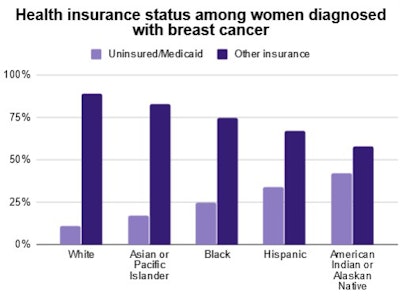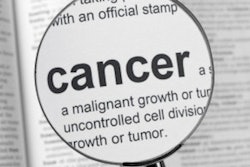
Racial and ethnic minority women are more likely to be diagnosed with an advanced stage of breast cancer, and insurance may be partly to blame. Insurance status accounted for nearly half of the diagnosis disparity among minority women in a study published online January 9 in JAMA Oncology.
Women diagnosed with later-stage breast cancer often require more intense treatments, which are ultimately more costly for the patient and society as a whole. The study is one of the first to quantify the effect health insurance status has on the stage of breast cancer at diagnosis.
"Insurance is a modifiable risk factor and having adequate health insurance for all could reduce the persistent racial outcome disparities in breast cancer," wrote the authors, led by Dr. Naomi Ko from the Boston University School of Medicine and Boston Medical Center.
Previous research has established that insurance status has a direct relationship with breast cancer outcomes, especially for racial and ethnic minority women. However, few other studies have tried to quantify insurance's effect.
To do just that, the researchers analyzed data from about 177,000 women between the ages of 40 and 64 who were diagnosed with invasive stage I to III breast cancer.
Women with Medicaid or no insurance coverage were more likely to receive a stage III cancer diagnosis than women with other types of insurance. They were also slightly younger at diagnosis and less likely to be Luminal A positive.

In addition, a greater proportion of racial and ethnic minority women were diagnosed with locally advanced stage III cancer. But this difference was essentially eliminated once the researchers accounted for insurance status and other variables.
"After adjusting for demographic clinical characteristics and country-level [socioeconomic status] factors and health insurance status, racial/ethnic minority women all had between twofold and fourfold higher odds of being uninsured or having Medicaid at the time of breast cancer diagnosis compared with [non-Hispanic white women]," the authors wrote.
In a supplemental calculation, the researchers estimated that having Medicaid insurance or no insurance at all accounted for almost half of the later-stage diagnoses for non-Hispanic black women, American Indian or Native women, and Hispanic women.
Notably, the study findings may not apply to women in other age groups, and the authors weren't able to account for patient-specific factors, such as obesity. They also acknowledged that tackling health insurance alone will not fully solve the racial and ethnic disparity in late-stage breast cancer diagnoses.
"We acknowledge that our findings do not suggest that insurance alone will eliminate racial/ethnic disparities in breast cancer, as studies have demonstrated that equal insurance coverage and access to care will not fix the problem," the authors concluded. "However, the ability to quantify the association that insurance has with breast cancer stage is relevant to potential policy changes regarding insurance and a prioritization of solutions for the increased burden of cancer mortality and morbidity disproportionately placed on racial/ethnic minority populations."



















